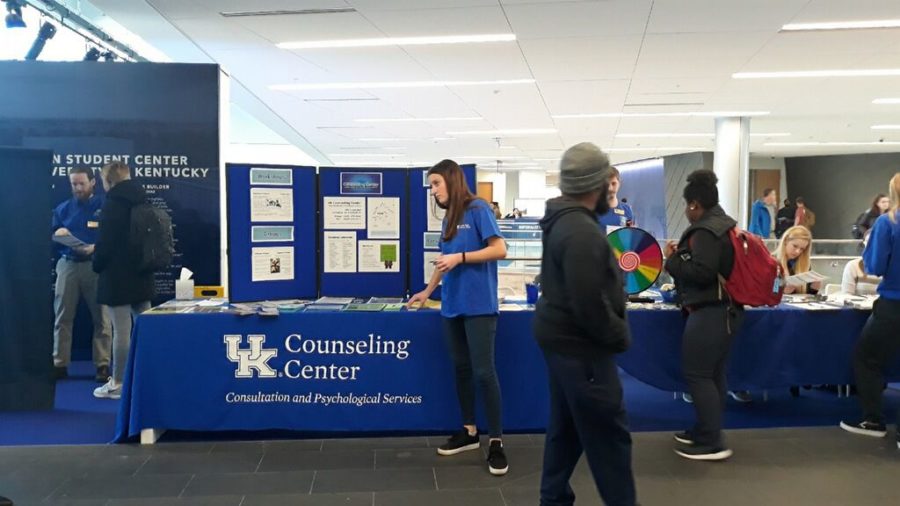UK Counseling Center fights stigma against mental health
University of Kentucky Counseling Center personnel work a booth in the Gatton Student Center on Wednesday, Feb. 13, 2019, in Lexington Kentucky. Photo by Sarah Ladd | Staff
February 17, 2019
Psychological professionals at the UK Counseling Center are fighting the stigma against mental health by providing a number of resources to students, right on campus.
Employing 18 clinicians who are Licensed Psychologists and 4.5 APA doctoral interns and located in Frazee Hall, the UKCC offers easy-to-access services for prevention and stress management, in addition to group, couples and individual counseling with licensed psychologists.
The Relaxation Room helps students implement the skills to soften or soothe stress, by either working toward calming the mind or incorporating physical relaxation or body stimulation. “Let’s Talk” provides students with access to informal, confidential conversations with clinicians from UKCC, at six sites around campus on Monday through Thursday. The counseling center also offers drop-in Wildcat Wellbeing Workshop on a number of subjects, including beating test anxiety, introduction to biofeedback, major and career decision making, meditation and more.
These resources are made available to students enrolled in six or more credit hours, or graduate students in thesis or dissertation credit status.
Mental health is a growing concern on many college campuses, yet there is still a stigma against mental health resources. UKCC hopes to eliminate this stigma by providing psychoeducational outreach programs and screening events that provide information and reduce stigma around help-seeking.
“As a campus, it’s important to recognize that mental health is health. Period,” said Dr. Mary Chandler Bolin, Licensed Psychologist and Director of the UK Counseling Center, where she has worked since 1997.
“The brain is part of the body and having out-of-balance brain chemistry is no more shameful than being diabetic, for which many people regularly see a physician and take active steps to manage symptoms through nutrition, exercise and compliance with prescribed medication,” she said.
The UK Counseling Center seeks to clarify the definition of mental health. It involves health in the realm of one’s psychological functioning, including emotions, cognitions, behaviors and interpersonal aspects of life, while mental health concerns are a range of conditions that have symptoms that can impair daily living and cause distress.
Many are under the misconception that mental health typically involves depression. In recent years, however, anxiety has passed depression as the most frequently endorsed concern for those seeking psychological services. According to data provided by Bolin, for clients at the UKCC, anxiety (all types), stress, depression, generalized anxiety and family concerns are the five most-reported concerns related to mental health between July 2018 and December 2018.
UKCC seeks to serve students dealing with these mental health issues, and others, through all their resources, especially counseling sessions. First-time appointments consist of an Initial Assessment, many of which occur as a same-day walk in appointment, during which clinicians work to understand the client’s needs, and then make recommendations for further services.
Individual therapy meetings generally last 45-50 minutes, with support groups and therapy group sessions lasting 60-90 minutes.
“The power of the group is that students often discover that they are not alone in their experiences, and they may both offer and receive support from peers,” Bolin said.
Employees at the UKCC are seeing a rise in the number of students who are utilizing the counseling sessions. Students who used the UKCC for direct psychological services from July 2018 to December 2018 numbered 1,626, this being a 22 percent increase for the same period in the previous year. Overall, Bolin said this means the counseling center sees 5-10 percent of the student population. The goal is to continue reaching out to students who are navigating their college years and the mental health obstacles that come with that.
“The traditional college years – ‘emerging adulthood’ (and beyond) – are a time of growth and change marked by challenge… UKCC supports healthy development of a student’s identity, direction in life, interpersonal interactions, independent decision-making, resilience, and ability to determine what one can manage alone versus when consultation or therapy may be useful,” Bolin said.






























































































































































